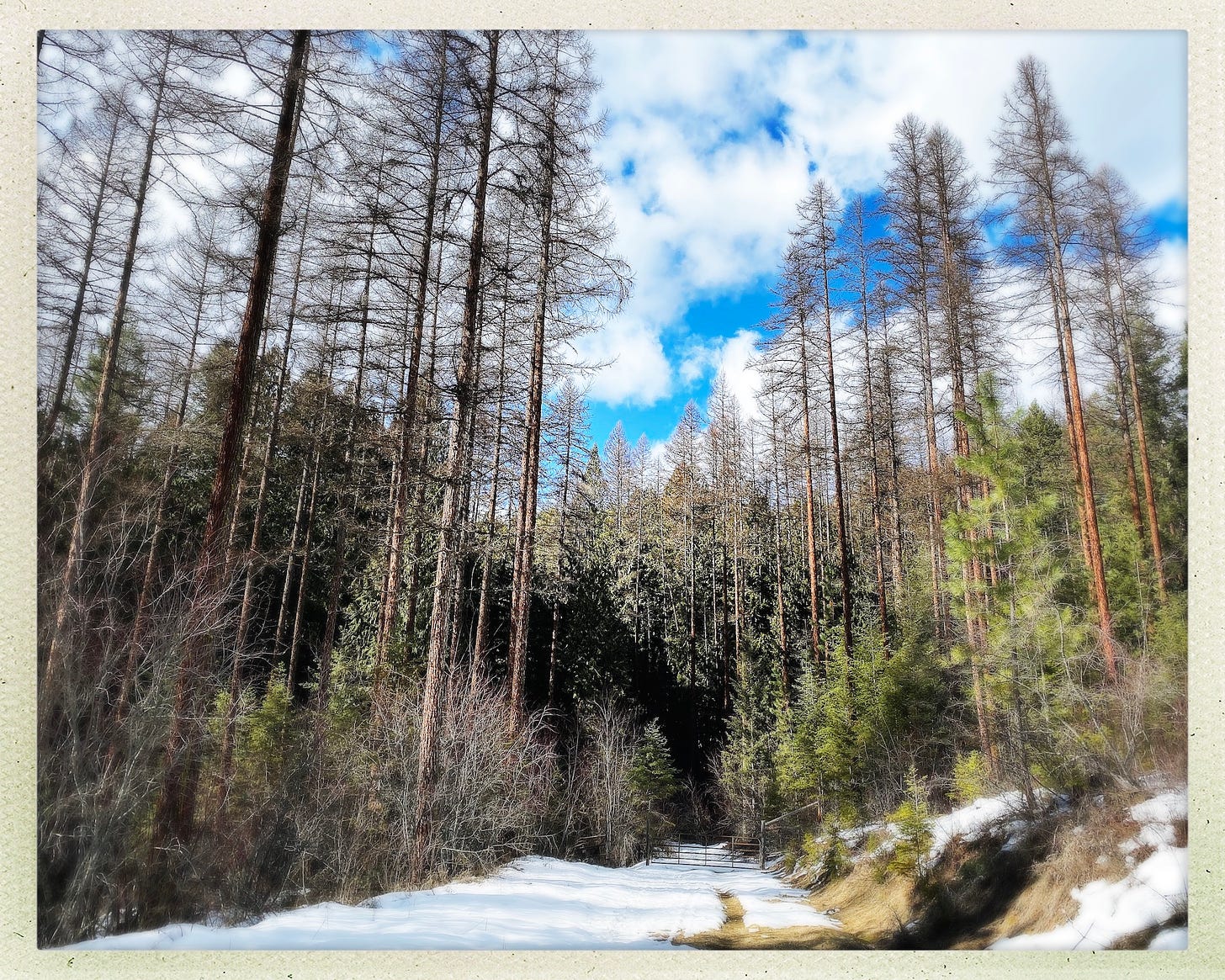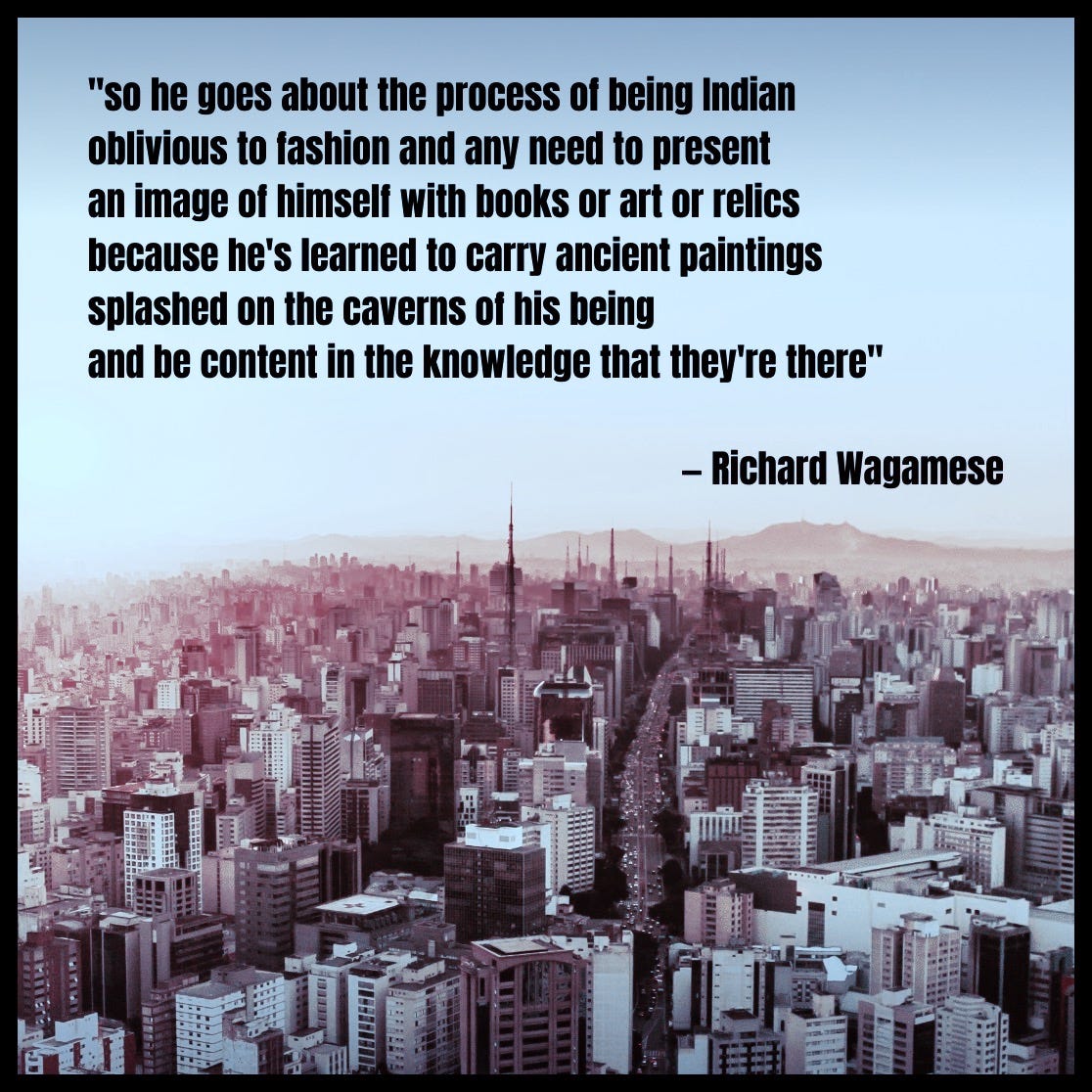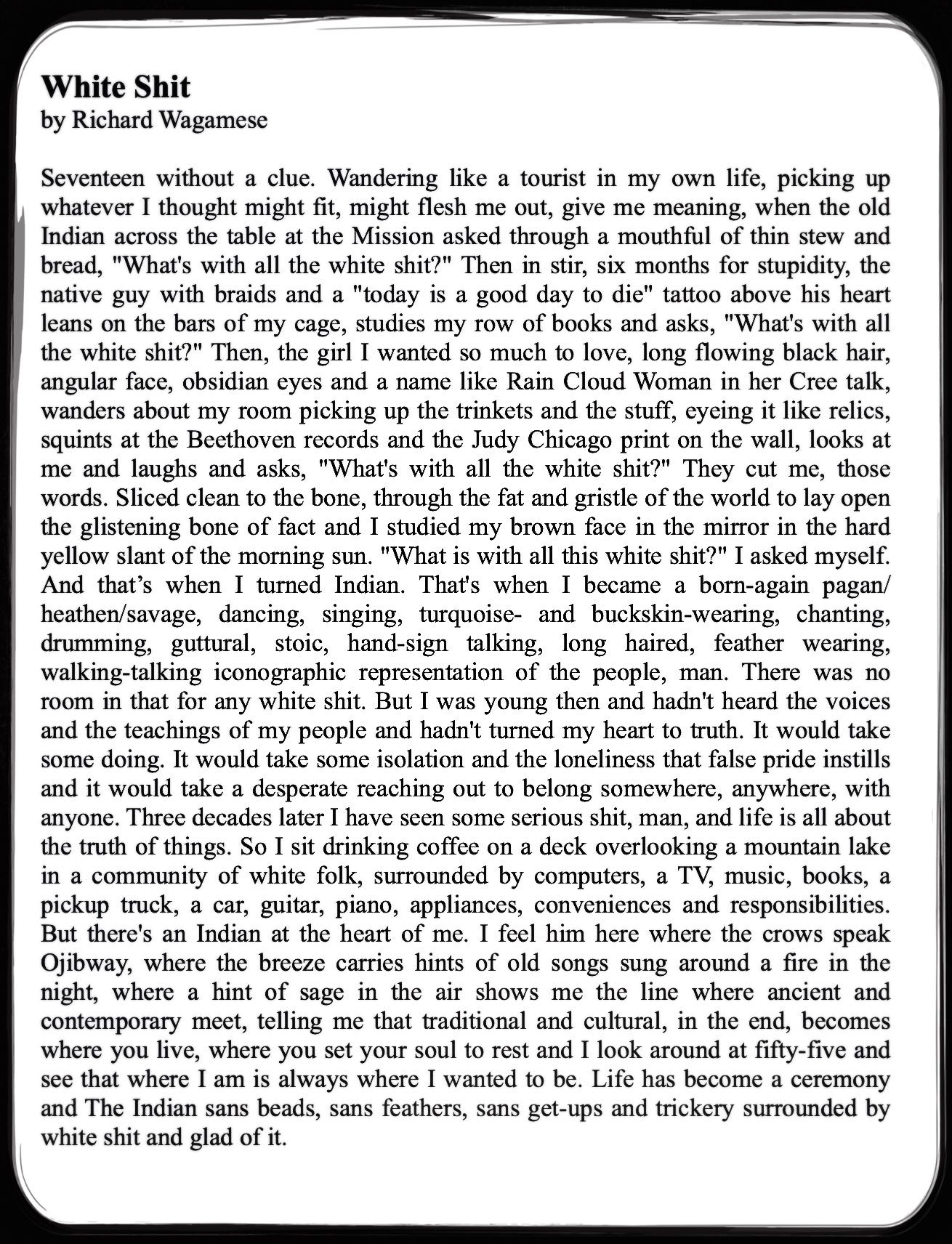I recently read a book of poetry by the Ojibwe writer Richard Wagamese called Runaway Dreams. Over the last few years and a handful of books Wagamese has become one of my favorite writers but it wasn't without trepidation that I approached his poetry. Not everyone can make that crossing-over once they’ve established themselves as a prose writer, or vice versa.
I don't know what I was thinking. Of course I loved the book. Of course his reflections from the perspective of a middle-aged Indigenous man would hit me in the heart. I often stare into a mirror at the face of a stranger myself, feeling mostly old and invisible and more sensitive to unexpected barbs than I’d like but also more full of love and sadness and appreciative of beauty than at any point in my life. It’s a book I keep going back to and probably will for a long time. His pursuit of peace of mind through embracing silence and stillness is a trail I am well-acquainted with.
Wagamese died on March 10th of 2017. He was only 61 years old. I like to quip that I only hope to make it to 60 myself and that I’m likely to collapse at the finish line if I even get that far but time will tell. Nonetheless, I wish Wagamese hadn't left us so soon. I'd have liked to meet him. Thankfully I still have a few of his books I haven’t read yet, so there’s that. Through his work—which includes the wonderful Embers: One Ojibway’s Meditations, that I have also been revisiting lately—he has become a teacher to me. An Anishinaabe elder speaking from the other side about how to live in a world not just with other Indians, but with all the People. I need all the help I can get.
The “Native News This Weekend” newsletter that hit my inbox Sunday from Native News Online reports two stories that are opposite sides of the same coin. The first to catch my eye was a headline that reads, “China Calls What the U.S. did to Native Americans ‘Genocide’.” The gist from the article is this:
The Chinese Embassy in Washington D.C. has released a statement titled, “The American Genocide of the Indians—Historical Facts and Real Evidence,” in the “news” section of its website. The statement identifies the definition of “genocide” and goes on to state that, “According to international law and its domestic law, what the United States did to the Indians covers all the acts that define genocide and indisputably constitutes genocide.”
The point of the Chinese statement isn’t just to remind the United States of its own brutal and ongoing human rights abuses, it’s to provide a cover of its own, particularly “the controversy from the last several years over the incarceration and treatment of the Uyghurs in the northwest Xinjiang region of China.” The Chinese government isn’t really in a place to point fingers at anyone else, you know?
And yet the truth they lay out about the American record is spot on. The United States did visit genocide on North American Indigenous people. It still is visiting it. The vast majority of Americans, I suspect, know something happened but not anywhere near the full story. Nor that policies exist to continue that genocidal relationship.
Which takes us to the next article headline that caught my eye: “Right Wing Media Targets Saginaw Chippewa Woman.” The article opens:
In its coverage of President Joseph Biden’s first State of the Union Address last night, right wing media targeted a guest of First Lady Dr. Jill Biden—Melissa Isaac, Saginaw Chippewa.
What could these chuckleheads have against Melissa Isaac, besides her mercilessly crushing everyone else in attendance’s sartorial choices with that gorgeous ribbon skirt?
NNO journalist Darren Thompson further reports:
Fox News wrote in a feature titled, “Jill Biden SOTU guest is critical race theory supporter,” that Isaac “has a history of rejecting arguments on social media made against the teaching of critical race theory.”
See what I mean about two sides of the same coin? On the one hand the Chinese are holding the USA accountable for actions that American media are in an uproar that an Indigenous woman wants Americans to know about.
The ongoing ridiculousness of all this “critical race theory” rhetoric is just … I just can’t even.
Leave it to a Chippewa woman to have it all in perspective, though:
“This is all a distraction from the goodness of the event and having Anishinaabe representation in such a historic event,” Isaac told Native News Online. “Taking away from the progress that myself and Deb Haaland—Indigenous women—who are reclaiming and taking up space and places they never thought they’d see us.”
“To me that’s the real headline, all the other things are a distraction,” she said.
And that skirt! Oof.
It isn’t easy being an Indian in the USA no matter where you come at it from. There is the struggle of living in a colonized world compounded by the struggle with how poorly we all tend to get along. Richard Wagamese was no stranger to the hardship; he had an incredibly difficult first third of his life. He was taken from his biological family as a child and forced to live in a foster home where he was not allowed any contact with his Indigenous heritage. He was a runaway; lived on the streets, got caught up in drugs and alcohol, spent some time in jail … then ultimately found his way home to his Ojibwe people. Even that wasn’t easy. He details some of that arc in his poem, “Born Again Indian.” This is an excerpt of a single stanza that I love:
The poem is largely about how difficult other Indians made it for him to return to his people. That it took the wisdom of age and time in the company of elders to realize what it really means to be an “Indian.” That it isn’t all the trappings and bullshit that Indians fight about over Twitter; how “dark” you are, how much “percentage of Indian blood” you have, who is more “traditional” than the next person, where you have to live to be a “real” Indian, all of it. Those are the words of settler colonialism. Of white supremacy. We stew in it every day, all of us. Even non-Indigenous people are dragged down by it. It soaks into our lives and our actions such that we don’t even know how firmly in the grips of it we are. Breaking free is the work of a lifetime.
There are so many ways Indian people are exploited and taken advantage of. All brown people, for that matter; all poor people. All people. If you’ve followed this newsletter for any amount of time you know how I feel about cops and the military. Yet when it comes to the armed forces Indigenous people, per capita, enlist in greater numbers than any other demographic. Which means we die in great numbers too, for a country that doesn’t care about us, that as recently as 1978 made it illegal for us to practice our traditional religions. I really struggle with it. I wish more of us could have the courage of Muhammad Ali when he refused the draft for the Vietnam War:
“Why should they ask me to put on a uniform and go 10,000 miles from home and drop bombs and bullets on Brown people in Vietnam while so-called Negro people in Louisville are treated like dogs and denied simple human rights? No I’m not going 10,000 miles from home to help murder and burn another poor nation simply to continue the domination of white slave masters of the darker people the world over. This is the day when such evils must come to an end. I have been warned that to take such a stand would cost me millions of dollars. But I have said it once and I will say it again. The real enemy of my people is here. I will not disgrace my religion, my people or myself by becoming a tool to enslave those who are fighting for their own justice, freedom and equality. If I thought the war was going to bring freedom and equality to 22 million of my people they wouldn’t have to draft me, I’d join tomorrow. I have nothing to lose by standing up for my beliefs. So I’ll go to jail, so what? We’ve been in jail for 400 years.”
― Muhammad Ali
Of course others are in different circumstances than Ali was. And I am grateful there are organizations to help me in my compassion for the choices that make people veterans of a military who only ever wanted us all dead. Like the folks at NDN Collective, who handle this particular issue with a lot of love and nuance that I am able to learn from. In the introduction to their position paper called “Demilitarization is Decolonization,” they state the following:
Having a Relative, an uncle, an auntie, a cousin, a grandpa who served in the military is not uncommon in Indian Country. In fact, seeing veteran service hats that read “Vietnam Veteran” or “Native Vet” combined with embroidered feathers or an eagle is a guaranteed sight at any powwow or flea market. We have love for our Relatives that have seen war and came back; we have love for all our Relatives. We know that there are many unique motivations behind the enlistment of Indigenous people in the military, sometimes influenced by a sense of duty to protect our homelands and a long history of warrior culture. Relatives also enlist due to a lack of financial opportunities, lack of secondary education resources, or from familial influence– all examples of poverty draft. Yet NDN Collective’s understanding is that the United States military and the Military and Police Industrial Complex (MPIC) have exploited our circumstances and our connection to warrior culture, and are ultimately pathways for exploitation and destruction of our communities within Turtle Island and internationally. We, as a collective of Indigenous people, stand with all Indigenous people everywhere who face the ongoing effects of colonialism, imperialism, climate change, capitalism, and genocide, in our position for demilitarization and Indigenous liberation as antimilitarist.
What a beautiful commentary. It makes room for the choices our vets have made, have possibly had to make, yet makes a case for a different approach. I love it. We don’t have to buy into that exploitation any more. Not in the military, not anywhere else.
I wish I had the courage to risk going to jail for not paying taxes. I don’t like that such a huge percentage of what I earn is directed to death and destruction visited on other people who aren’t so different from me in the interests of a wealthy few. Instead I can make the easier stand against, for example, Facebook (or whatever they call themselves these days), another juggernaut whose sole existence is the practice of exploitation. It is a pathetic stand, particularly when compared to Muhammad Ali, but it’s something, even if it leaves me on the outside looking in to most of the rest of our modern culture.
I am usually advocating for people I never see or hear from. My tribe communicates almost exclusively via Facebook so I rarely know about what’s going on unless Nora Mabie writes about it. There are no Indians in my day to day life and it’s unlikely there ever will be. Which I’m growing closer to accepting. I am making choices about where I live and how I engage with the world that sets me apart from much of it. But not in my interior world.
In another poem Wagamese talks about being mocked by other Indians for having too much “white shit.” He means the trappings of the white man; books, music, art, clothes, etc. He discusses this at more length in his memoir One Native Life too. How he became a “Super Indian” in his efforts to be everything he thought an Indian should be, at least on the outside. How that didn’t make him any happier or give him any more of a sense of belonging than anything else ever did.
I’m surrounded by white people and “white shit” myself and I love many of them and lots of it. The majority of problems I have I share with my white community as well, it’s just a matter of degree. No lives matter until Black lives matter. The struggle for Indigenous liberation is the struggle for human liberation. All of that. So like Wagamese I sit here at my desk, surrounded by my own “white shit,” trying to make sense of it all, making an effort to find a similar wisdom to carry out into the world.
We are all in this together, every one of us. We can choose to blind ourselves to one another’s struggles or we can all seek to live our lives as a ceremony, together. What an idea to strive for.
We do the best we can with where the circumstances of our lives lead us. We struggle. We guide and receive guidance. None of it is easy. For anyone.






Chris,
I like to think we start out life with a wheelbarrow full of integrity, and every day we must push that wheelbarrow around through the personal acts of living our life. We push the wheelbarrow and occasionally hit a bump or a rock, and invariably some of that precious integrity spills out, and once that bit is gone, it is gone. However, we still have some integrity left to push around and protect from our mistakes and miscalculations and other human frailties. If we do the living part right at the end of that inevitable day when we set that wheelbarrow down and it's not empty, then we did it right.
I only know you through your writing, but I sense that just like Richard Wagamese, you have turned your heart toward truth. Wishing you 60 plus 60 years and a full wheelbarrow.
I thought I’d read everything Richard Wagamese wrote at least twice. Not sure how I missed this one. Giving thanks to kindle this morning! I think a measure of Richard’s brilliance is that his words speak just as strongly to a post-middle-age white woman as they do to you. And that I too can and do consider him a great teacher. We are indeed all in this together. All I can do is try not to contribute more white shit.
Line from first random poem read: “in the sky are pieces of me”.
Thanks, Chris. 💚